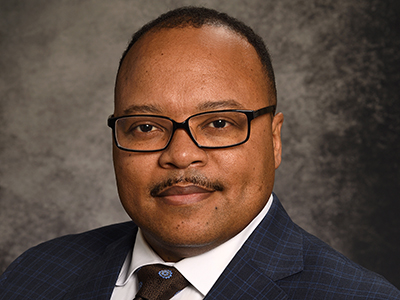 In honor of Black History Month, General Surgery Resident Katherine McElroy, M.D., and Vice Chair of Diversity, Equity and Inclusion Colin Martin, M.D., FACS, sat down with Cardiothoracic Surgeon Allan Pickens, M.D., who completed his medical degree at UAB as well as his general surgery residency training.
In honor of Black History Month, General Surgery Resident Katherine McElroy, M.D., and Vice Chair of Diversity, Equity and Inclusion Colin Martin, M.D., FACS, sat down with Cardiothoracic Surgeon Allan Pickens, M.D., who completed his medical degree at UAB as well as his general surgery residency training.
Pickens is now an associate professor with the Emory Department of Surgery. He is also program director of the cardiothoracic residency and integrated residency. Finally, he is the director of minimally invasive thoracic surgery at Emory Healthcare.
How has your training as a Black UAB resident impacted your career to date?
“During my training at UAB, I learned to deal with race in the workplace. I think I was the third African American surgical resident in the UAB general surgery residency program, which had been in existence for many years. I learned to take the high road and deal with uncomfortable racial situations professionally. Uncomfortable racial incidents occurred with both patients and faculty. I continue to reflect on those experiences to guide my hospital interactions today.”
How can programs be more inviting and inclusive of minoritized residents?
“Pipeline programs from underrepresented in medicine (URIM) communities would certainly increase recruitment of minorities. Meeting UAB faculty with similar backgrounds and ethnicity would help as well. Sponsoring URIM medical student rotations at UAB would allow trainees to experience UAB and dispel some Deep South myths.”
What do you see as barriers of success in the training and the careers of Black surgeons?
“Mentorship remains a challenge for many Black surgeons. Black surgeons are often one of few on faculty at many institutions. We often have to look outside of our home institution to get reliable mentorship. This can be challenging during early career development. Fortunately, the internet and video conferencing has made this much easier.”
In your experience, what fosters racially and culturally sensitive care for minoritized patients?
“I think recruitment and retention of URIM faculty fosters racially and culturally sensitive care for patients. Even if the minority patient is not under the direct care of a minority physician, they witness the institutions value of diversity. A diverse hospital staff promotes health equity.”
Looking back, if you can tell yourself one thing as a Black resident in training, what would it be?
“I would remind myself to look beyond my immediate surroundings. Think bigger. Look for mentors around the world. Expanding your professional network creates more opportunities.”
Looking ahead, what would you tell your future self as a successful Black surgeon?
“I would tell my future self to embrace technology and continue to learn. When you learn something, make plans to share that knowledge with future surgeons. We will be the beneficiaries of the teaching.”